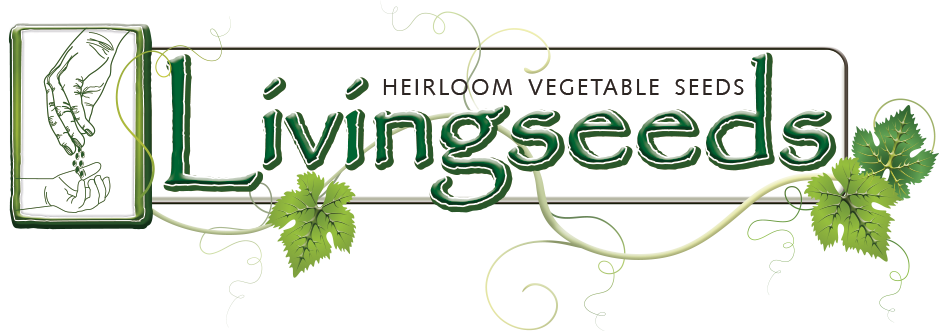InfoBar
The InfoBar was developed by Livingseeds to provide our customers with as much in-depth planting information for each variety as possible, giving you the tools for success at your fingertips.
All seed packets have our InfoBar label on the back of the packet for easy reference.
A lot of work has gone into the development of our InfoBar and we trust that this information will help you in making informed gardening decisions.
All seed orders are shipped with a free InfoBar leaflet.
THE INFOBAR

ICON KEY
African Heirloom: This
is a traditional African variety. Typically collected in deep rural
villages throughout Africa. These varieties have developed natural resistance to local diseases.
Heirloom: Typically
a variety that has been handed down from generation to generation and is older than 60 years.
African Open Pollinated: Typically known in the industry as a "landrace", these are African varieties that have a rich genetic diversity, are Open Pollinated but do not have heirloom status.
Open Pollinated: A variety (if kept pure) that will breed true from season to season.
____________________________________________________________________________________________________________________________________________________________________________________________________________________________________________________________________________
SOWING METHOD
Transplant: This seed is best started in seedling trays and then transplanted once they are past the two true leaf stage.
Sow Direct: This seed is best sown directly in the soil. These seeds do not enjoy being transplanted, if you do you could reduce your yield.
____________________________________________________________________________________________________________________________________________________________________________________________________________________________________________________________________________________________
EASE OF GROWTH
1 = Very Easy
2 = Medium
3 = Can be challenging
______________________________________________________________________________________________________________________________________________________________________________________________________________________________________________________________________
PLANT USE
Insect deterrent: Deters insects in the home and/or garden.
Medicinal: This variety is or has been used for medicinal purposes. (Please consult your Doctor / Medical practitioner before use)
Benificial Insect Attractor: Attracts beneficial and Predatory insects for either their pollen and/or nectar.
Cuisine: A well-known cooking variety, suited for home cooking and sought after by professional chefs.
Root Crop: Grown mainly for harvesting its root.
Salad Greens: Grown mainly as a leaf crop or the young leaves can be used as salad greens.
Dry Beans: Superb dry bean variety.
Green Beans: Grown mainly as a green bean crop.
Shelly Beans: The beans of this variety are well suited for use as shelly beans.
Culinary: Denotes Herb varieties that are used for culinary purposes.
__________________________________________________________________________________________________________________________________________________________________________________________________________________________________________________________________
GROWTH HABIT
Pots / Small Gardens: This variety is suitable for planting in pots or small gardens, as they do not take up a lot of space.
Train / Trellis / Pole variety: This variety can be trained up a lattice/fence/pole or string.
Indeterminate: This tomato variety will do best trained up a string or in a wire cage. Will produce continuously.
Bush / Determinate: This plant has a bush or compact growth habit.
Sprawling: This variety will sprawl and send out runners along the ground.
PLANT TYPE
T = Tender
A = Annual
P = Perennial
H = Hardy
HH = Half Hardy
_________________________________________________________________________________________________________________________________________________________________________________________________________________________________________________________________________SEED TREATMENT KEY
A) Soak Overnight
Certain seeds like beetroot and Swiss chard have a very corky seed coat. Soaking them overnight allows water to penetrate the coat and assists with germination.
B) Sow shallowly in beds and cover with a hessian cloth
Fine seeds are best sown very shallowly, the problem now is that the top surface of the soil dries out very quickly. Covering with a hessian cloth, traps the moisture in the top soil layer allowing the seeds to germinate effectively.
C) Chill in fridge for 2 weeks
Several seed varieties need cold treatment before sowing. If not chilled, the seed’s internal ‘germination mechanism’ does not get turned on.
D) Soak in boiling water overnight
Seeds with a very hard seed coat, often do not germinate without the boiling water treatment. Drop the seeds into boiling water and allow to stand overnight. The ones that have visibly swollen by the next morning can be planted. Repeat the process with the un-swollen seed.
E) Needs light to germinate
Light is a requirement of several seed varieties. If planted too deeply the seeds simply will not germinate. In this case, the seeds should be very lightly covered with fine sand, soil or vermiculite.
F) Needs bottom heat to germinate
Hot and Extreme Chillis as well as Brinjals are real heat lovers, without bottom heat germination can be slow and erratic. Bottom heat is generally applied using a heating pad (available from Livingseeds).
G) Will benefit from bottom heat
These seeds will germinate without bottom heat. However, the additional heat stimulates faster, more even germination.
H) No special treatment required
I) Prefers cool germination temps
These varieties prefer cool soil to germinate. The seed often will not germinate if the soil temperature is too high.
